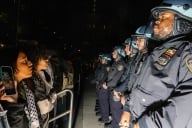You have /5 articles left.
Sign up for a free account or log in.

Supporters of Palestine gathered for an Oct. 14 rally at Harvard University.
Joseph Prezioso/AFP via Getty Images
Political tensions on college campuses are at an all-time high as conflict rages in Israel and Gaza. As a residence life staff member living among students, I’ve seen, heard and felt firsthand how students’ emotional and mental well-being is being affected—not just as a result of the senseless violence in the Middle East, but also due to the vitriol and weight of political conversations happening on campuses and online. University faculty members and administrators are, admirably, juggling a lot at this moment: their own political and personal views, managing their institution’s response and public relations, and, of course, teaching and research. Countless academics have taken to social media to express their viewpoints on the conflict, campus activism and their institution’s handling of this moment. Yet it appears that many in the faculty and administration of institutions of higher education have seemingly forgotten to consider whose well-being should be their priority: students.
At Harvard University, the conservative “media watchdog” organization Accuracy in Media has deployed a mobile digital billboard truck displaying names and faces of Harvard students under the banner “Harvard’s Leading Antisemites.” Some students were targeted for online doxing, with their identities being publicly broadcast for their alleged student organization leadership and support of a letter circulated on campus denouncing violence in Gaza and supporting the Palestinian cause. “I’m scared that this kind of targeting will lead to someone who looks Muslim getting attacked. It’s just a matter of time before something serious happens,” a graduate student said. Harvard University Police were unable to move the truck, as it remained on public roads adjacent to campus.
National media picked up the letter from Harvard’s Palestine Solidarity Committee, which asserted that Israel was “entirely responsible” for the Oct. 7 Hamas attacks, leading to widespread backlash from politicians and academics on social media. While all are entitled to express their opinions and beliefs about the student letter, some in higher education are seemingly forgetting who might be reading their posts calling students and their speech “morally ignorant,” as Harvard’s own Introduction to Economics Professor Jason Furman put it. Lawrence Summers, a former Harvard president, called the students who signed the letter “naive and foolish” and their very ideas and beliefs “morally unconscionable.” Throwing your students under the bus to protect your image and keep yourself distanced from ideas you don’t like is what’s morally unconscionable in this situation.
Now, both Summers and Furman have publicly walked back their remarks, seeing that students are facing right-wing intimidation on campus and calls from corporate leaders to be blacklisted from careers at their companies. “It is a time for absolute clarity that words or deeds that threaten the safety of others in our community will not be tolerated,” Summers said on X: yet perhaps if he had thought before he posted and considered the needs and safety of the students at the very institution he once led, maybe the campus and online climate could have been kept cooler.
Furman wrote that he was “appalled by people threatening individual students. I’m even more appalled since many of them had nothing to do with the letter.” Perhaps both individuals could have considered their followings, numbering hundreds of thousands on X, before drawing further attention and ire to what are, at their core, the extracurricular and activist pursuits and passions of their students.
This issue, of course, is not unique to Harvard. Steven Davidoff Solomon, a law professor at the University of California, Berkeley, penned an op-ed for The Wall Street Journal headlined “Don’t Hire My Anti-Semitic Law Students,” in which he openly condemned his students’ ideas, threatened their employability and celebrated a law firm’s decision to rescind a job offer from a student on another campus based on that student’s views on the Hamas-Israel conflict. Has Solomon forgotten who pays his salary with their tuition dollars? His efforts would be better served educating his students rather than publicly condemning their beliefs and encouraging employers to pass them over.
For faculty and administrators ready to publicly condemn their students, consider: Isn’t it your very own classes and departments, the very education your institution offers, that is leading students toward these ideas you find so reprehensible? Denounce that if you think that’s the problem. Instead of denigrating students, where are the calls for resignation of faculty who express similar views in your own ranks? Clearly, those speaking up against campus activism and the beliefs of their own students see no personal responsibility in how we’ve gotten to this point.
It’s not difficult to draw a connection between a trend of decreased focus on teaching and further emphasis on research and publication for faculty. Professors who are, instead, focused on the craft of teaching—building classroom community, cultivating psychological safety and helping students develop into scholars and leaders—would know better than to publicly inflame responses to campus activism. Faculty members can and should express their opinions, but not in a way that demeans and attacks the young adults in their lecture halls and at their seminar tables.
Faculty members and administrators cannot control social and news media attention to campus activism. Regardless of what faculty and administrators think of the protected political speech of student activists, they must consider their influence and immense power before releasing public statements about the very students whom they are paid to teach. When social media users pick up on faculty and university officials publicly turning on their students, it emboldens bad actors to target these students.
There is a time and place for faculty members, especially those with public prominence, to engage in debate and scrutiny of ideas, especially those of their students. But on a public social media platform, in the midst of a global crisis fanning the flames of Islamophobia, antisemitism and dehumanization—this is neither the time nor the place. Academics and administrators alike should feel an obligation to call out war crimes, the slaughter of innocent civilians, antisemitism and Islamophobia, but not in a way that jeopardizes the safety and well-being of their students.
The very ideas and values of higher education are already in question in this country. Instead of normalizing faculty denunciations of statements from student clubs comprised of 18- to 22-year-olds, let’s hold faculty to a higher standard. It should not be controversial to put students’ safety and well-being first. Recognizing our common humanity starts on campus, and those in positions of power and public influence in academia have to be the ones to start remembering the humanity of the students they teach.








